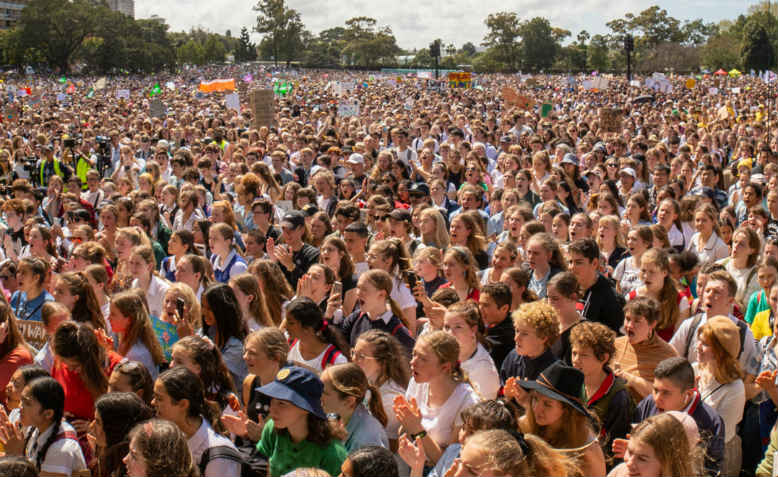 Climate Strike, Sydney, September 2019. Photo: Wikimedia Commons
Climate Strike, Sydney, September 2019. Photo: Wikimedia Commons
Lucy Nichols reports on twelve months of student-led protest
In February 2019, thousands of British schoolchildren walked out of their classrooms and took to the streets, demanding that the Conservative government do more to tackle the climate crisis. A month later, 1.4 million young people in 123 countries did the same. This was the first in a series of huge global strikes where school children, trade unionists, and many others have marched to demand climate justice. The most recent strike, in September of last year, saw 4 million people take part worldwide.
The mass mobilisation against the climate crisis in the last year has been unlike any other, with schoolchildren organising protests all around the world, as well as the weeks-long disruptions organised by Extinction Rebellion. The most prominent face in this movement is Greta Thunberg, the 17-year-old activist from Sweden who began her ‘School Strike for Climate’ in August 2018 and has remained on strike since then.
This January Thunberg will be speaking at the World Economic Forum in Davos, Switzerland about the imminent danger posed by the climate crisis.
For the fourth year in a row, the World Economic Forum has pledged to be carbon neutral. Amongst other things, it has committed to a 100% emissions offset, a reduced reliance on single-use plastic and a menu that is 50% plant based – it has even dedicated a whole day to a solely vegetarian menu. The forum has also acknowledged that the five biggest risks the Earth faces are all to do with climate change, with the climate crisis one of the main themes of this year’s summit.
These vain attempts at helping the planet are totally nonsensical. The attendees of the summit include all of the world’s worst capitalists, polluters, and climate change deniers, such as Donald Trump, George Soros, and the General Director of the International Monetary Fund. They will no doubt fly into Switzerland on private jets and leave a week later without any intention of doing anything to curb the worldwide crisis that they are facilitating. It is not in the interests of the elite to tackle climate change; their interests lie in the enormous multinational conglomerates that are steadily destroying our planet, like BP, Exxon, or Shell.
The threat we are facing is urgent, as proved by the recent wildfires in Australia that have killed half a billion animals and created smoke clouds that have circumnavigated the globe. It is the poor who feel the effects of climate change most strongly; the life-threatening floods in Indonesia and the famine in war-torn Yemen are clear examples of this.
The only way to combat the big businesses and governments that are fuelling the demise of our planet is through mass mobilisation and agitation. This is why everything possible must be done to support the next climate strike on 14 February, with protests taking place all over the UK.

